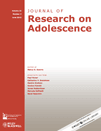
JOURNAL OF RESEARCH ON ADOLESCENCE
Scope & Guideline
Bridging Disciplines to Illuminate Youth Issues
Introduction
Aims and Scopes
- Adolescent Mental Health and Well-Being:
Research exploring the psychological aspects of adolescence, including the impact of peer relationships, discrimination, and coping mechanisms on mental health outcomes. - Cultural and Social Influences:
Investigations into how cultural, ethnic, and social factors shape adolescents' identities, behaviors, and experiences, particularly in relation to discrimination and social justice. - Family Dynamics and Relationships:
Studies focusing on parent-adolescent relationships, family structures, and their effects on adolescent development, including communication patterns and parental involvement. - Educational Contexts and School Climate:
Research examining the role of educational environments, peer interactions, and school policies in influencing adolescents' academic engagement and social behaviors. - Developmental Trajectories and Transitions:
Longitudinal studies tracking developmental changes during adolescence, particularly around significant life transitions such as moving from primary to secondary education. - Technology and Digital Interaction:
Explorations of the influence of digital technology on adolescents' social connections, mental health, and identity formation.
Trending and Emerging
- Impact of COVID-19 on Adolescents:
A significant rise in studies examining the effects of the COVID-19 pandemic on adolescents' mental health, social relationships, and educational experiences, highlighting the need for understanding this unique transitional period. - Intersectionality in Adolescent Research:
An emerging focus on intersectional approaches that consider how overlapping identities (such as race, gender, and socioeconomic status) impact adolescents' experiences and development. - Resilience and Coping Mechanisms:
Increased interest in exploring resilience and coping strategies among adolescents, particularly in the face of adversity, discrimination, and societal challenges. - Digital and Virtual Interactions:
Growing research on the role of digital communication and social media in shaping adolescents' identities, relationships, and mental health outcomes. - Social Justice and Advocacy:
An emerging trend toward research that supports social justice initiatives, examining how adolescents engage in activism and resist oppression, particularly regarding racial and ethnic issues. - Family Dynamics in Diverse Contexts:
Heightened attention on the role of family dynamics and cultural contexts in adolescent development, with studies focusing on various family structures and their influence on youth outcomes.
Declining or Waning
- Traditional Behavioral Models:
Research heavily grounded in traditional behavioral models seems to have waned, with a shift toward more nuanced understandings of adolescent behavior that account for contextual and relational factors. - Homogeneous Perspectives on Adolescence:
There appears to be a decline in studies that focus solely on Western, middle-class adolescents, as the journal increasingly emphasizes diverse and global perspectives on adolescent development. - Focus on Risk Behaviors in Isolation:
While risk behaviors remain a critical area of study, there is less emphasis on examining these behaviors in isolation, with a growing trend towards understanding them within broader social and environmental contexts.
Similar Journals

International Journal of Educational Psychology
Connecting Research and Practice for Educational ExcellenceInternational Journal of Educational Psychology, published by HIPATIA PRESS, is a premier platform for innovative research in the fields of educational and developmental psychology. With an impact factor reflecting a growing presence in the academic community, this Open Access journal has been delivering peer-reviewed studies since its inception in 2012, facilitating worldwide accessibility and collaboration. Based in Barcelona, Spain, this journal focuses on advancing knowledge and practice in educational psychology, providing insights for educators, researchers, and practitioners alike. As it converges through the years from 2018 to 2024, the journal proudly holds a Q3 quartile ranking in both Developmental and Educational Psychology and Education categories, highlighting its dedication to impactful scholarship. By engaging with the latest findings and fostering critical discussions, the International Journal of Educational Psychology aims to enhance educational practices and inform policy making, thus shaping the future of psychology and education.

Revista sobre la Infancia y la Adolescencia
Fostering understanding through multidisciplinary research.Revista sobre la Infancia y la Adolescencia is a premier academic journal dedicated to the multidisciplinary study of childhood and adolescence, published by UNIV POLITECNICA VALENCIA, EDITORIAL UPV. Since 2011, this Open Access journal has provided unrestricted access to high-quality research, making essential findings available to researchers, practitioners, and policymakers worldwide. With its ISSN number 2174-7210, the journal aims to foster a deeper understanding of the developmental and social issues affecting children and adolescents, exploring diverse topics including psychology, education, health, and social policy. As a critical platform for sharing cutting-edge research, it supports the dissemination of knowledge that is vital for advancing the well-being of future generations. Located in Valencia, Spain, the journal is keenly positioned to connect with a global readership interested in innovative approaches to child and adolescent studies.
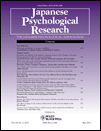
JAPANESE PSYCHOLOGICAL RESEARCH
Pioneering Studies in the Diverse Landscape of PsychologyJapanese Psychological Research, published by Wiley, is a distinguished journal dedicated to advancing knowledge within the field of psychology, offering a platform for original research that reflects the diverse psychological landscape of Japan and its global relevance. Since its inception in 1954, this journal has served as a valuable resource for researchers, professionals, and students alike, encouraging the dissemination of innovative theoretical and empirical findings. With an Impact Factor that places it in the Q3 category in Psychology (Miscellaneous) and achieving a rank of #125 out of 216 in general psychology according to Scopus, it is recognized for its contribution to the scholarly community. Although it does not currently offer Open Access options, the journal's rich archive from 1954 to present ensures a comprehensive collection of psychological studies. Engage with Japanese Psychological Research to explore insights into behavioral science, cognitive processes, and cultural influences on psychological practices, making it an essential read for those committed to understanding the multifaceted world of psychology.
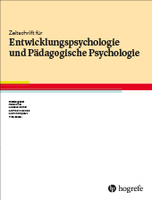
ZEITSCHRIFT FUR ENTWICKLUNGSPSYCHOLOGIE UND PADAGOGISCHE PSYCHOLOGIE
Exploring the Intersection of Psychology and PedagogyZEITSCHRIFT FUR ENTWICKLUNGSPSYCHOLOGIE UND PADAGOGISCHE PSYCHOLOGIE, published by HOGREFE VERLAG, is a pivotal academic journal based in Germany that focuses on the intricate fields of developmental and educational psychology. With an emphasis on innovative research and the latest theoretical developments, this journal aims to bridge the gap between psychological theory and educational practice. It holds a commendable Q3 ranking in Developmental and Educational Psychology and an impressive Q2 ranking in the broader field of Education, underscoring its relevance and contribution to the academic discourse. Although it does not currently offer Open Access options, the journal continues to provide substantial insights and findings that are crucial for researchers, educators, and students alike, thereby fostering advancements in both psychological research and educational methodologies. Spanning topics from childhood development to pedagogical strategies, this journal serves as an essential platform for disseminating knowledge within these interconnected fields.
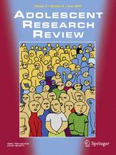
Adolescent Research Review
Innovating research for the well-being of adolescents.Adolescent Research Review, published by SPRINGER INT PUBL AG, is a leading academic journal dedicated to advancing the understanding of adolescent development across multiple disciplines, including Developmental and Educational Psychology, Pediatrics, Psychiatry, and Social Sciences. With an impressive impact factor, this journal ranks Q1 in four critical categories, reflecting its commitment to high-quality research and its influential role within the academic community. Since its inception in 2016, it has become an essential resource for researchers, professionals, and students seeking to explore the complexities of adolescence. The journal not only highlights innovative studies and theoretical advancements but also fosters interdisciplinary dialogue that informs policies and practices surrounding youth. With an assimilative approach to various fields, Adolescent Research Review serves as a vital platform for groundbreaking research that seeks to improve the well-being of adolescents worldwide.
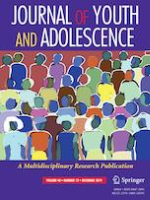
JOURNAL OF YOUTH AND ADOLESCENCE
Navigating the landscape of adolescent behavior.Journal of Youth and Adolescence, published by Springer/Plenum Publishers, is a premier scholarly journal that focuses on the developmental issues, behavioral challenges, and social dynamics faced by children and adolescents. Since its inception in 1972, this esteemed journal has provided a critical platform for innovative research, theoretical advancements, and empirical findings within the fields of Developmental Psychology, Educational Psychology, Social Psychology, and broader Social Sciences. With impressive quartile rankings, including Q1 in four distinct categories in 2023, it proudly ranks among the top journals in its field—standing at #21 out of 604 in Social Sciences (Miscellaneous), #88 out of 1543 in Education, and #29 out of 360 in Developmental Psychology. The Journal of Youth and Adolescence is dedicated to advancing knowledge and fostering dialogue among researchers, practitioners, and policymakers interested in youth development, thereby enhancing its impact on educational and social practice. Although the journal currently does not offer open access options, its rigorous peer-review process ensures high-quality publications that contribute significantly to the scholarly community.
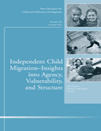
New Directions for Child and Adolescent Development
Championing evidence-based insights for a brighter tomorrow.New Directions for Child and Adolescent Development, published by Wiley-Hindawi, is a leading journal dedicated to advancing knowledge in the fields of child and adolescent psychology, educational development, and social psychology. With an impressive Q1 ranking in multiple categories—including Developmental and Educational Psychology and Social Psychology—this journal stands at the forefront of research innovation, making significant contributions to understanding developmental processes and challenges faced by children and adolescents. The journal spans a comprehensive publishing history from 1978 to 2023, allowing for a rich dialogue among researchers, practitioners, and students eager to explore emerging trends and methodologies. Researchers can access a wealth of studies and theoretical frameworks, enhancing the journal's stature within the academic community. New Directions for Child and Adolescent Development remains an invaluable resource for anyone committed to improving the lives of younger populations through evidenced-based practices and policies.
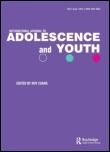
International Journal of Adolescence and Youth
Shaping the future of adolescent studies through open access.The International Journal of Adolescence and Youth, published by Routledge Journals, Taylor & Francis Ltd, stands as a premier platform dedicated to advancing the understanding of the social, emotional, and psychological dimensions affecting youth and adolescence. With an ISSN of 0267-3843 and an E-ISSN of 2164-4527, this esteemed journal has been committed to open access since 2014, allowing for broad dissemination of research that informs policy and practice. Based in the United Kingdom, this journal has exhibited its critical importance in the field by achieving a Q1 ranking in Health (social science) and placing 20th out of 371 in Scopus rankings with a remarkable 94th percentile standing. Covering a comprehensive range of topics from mental health to social influences, the journal serves as an essential resource for researchers, professionals, and students alike who are engaged in the multidisciplinary study of adolescent health and development. The publication timeline spans from 1987 to 2024, reflecting its rich history and commitment to contributing valuable knowledge to the academic community.

SOCIAL DEVELOPMENT
Driving innovation in developmental and educational research.SOCIAL DEVELOPMENT is a prestigious journal published by WILEY, dedicated to advancing knowledge in the fields of developmental and educational psychology, sociology, and political science. With the ISSN 0961-205X and E-ISSN 1467-9507, this journal has been a vital resource since its inception in 1992 and continues to publish high-quality research until 2024. Recognized for its impact, it holds a Q2 ranking in Developmental and Educational Psychology and top Q1 placements in both Social Sciences (Miscellaneous) and Sociology and Political Science for 2023. The journal ranks 103rd out of 604 in the Social Sciences category, reflecting its significant contributions to the discipline. Although it does not offer open access, researchers and scholars can access its compelling articles through institutional subscriptions or direct purchase. Located in the United Kingdom, SOCIAL DEVELOPMENT is committed to fostering an understanding of social dynamics and promoting scholarly discussion on pressing social issues, making it an essential resource for academics, practitioners, and students alike.
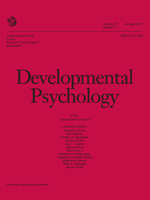
DEVELOPMENTAL PSYCHOLOGY
Shaping the Future of Developmental ResearchDEVELOPMENTAL PSYCHOLOGY is a prestigious journal published by the American Psychological Association, dedicated to advancing the field of developmental psychology through rigorous research and insightful analysis. With an impact factor that ranks it in the Q1 category for Demography, Developmental and Educational Psychology, and Life-span and Life-course Studies, this journal stands as a leading resource for scholars and practitioners alike. Since its inception in 1969, it has provided a platform for innovative studies that address crucial questions surrounding human growth and development across the lifespan. The journal is recognized for its high-quality contributions, as reflected in its impressive Scopus rankings, positioning it within the top tiers of its field. Although it is not an open-access publication, it remains an essential reading for those invested in understanding the complexities of development across various stages of life. Published quarterly, DEVELOPMENTAL PSYCHOLOGY plays a critical role in shaping future research agendas and informing practical applications in educational and clinical settings.